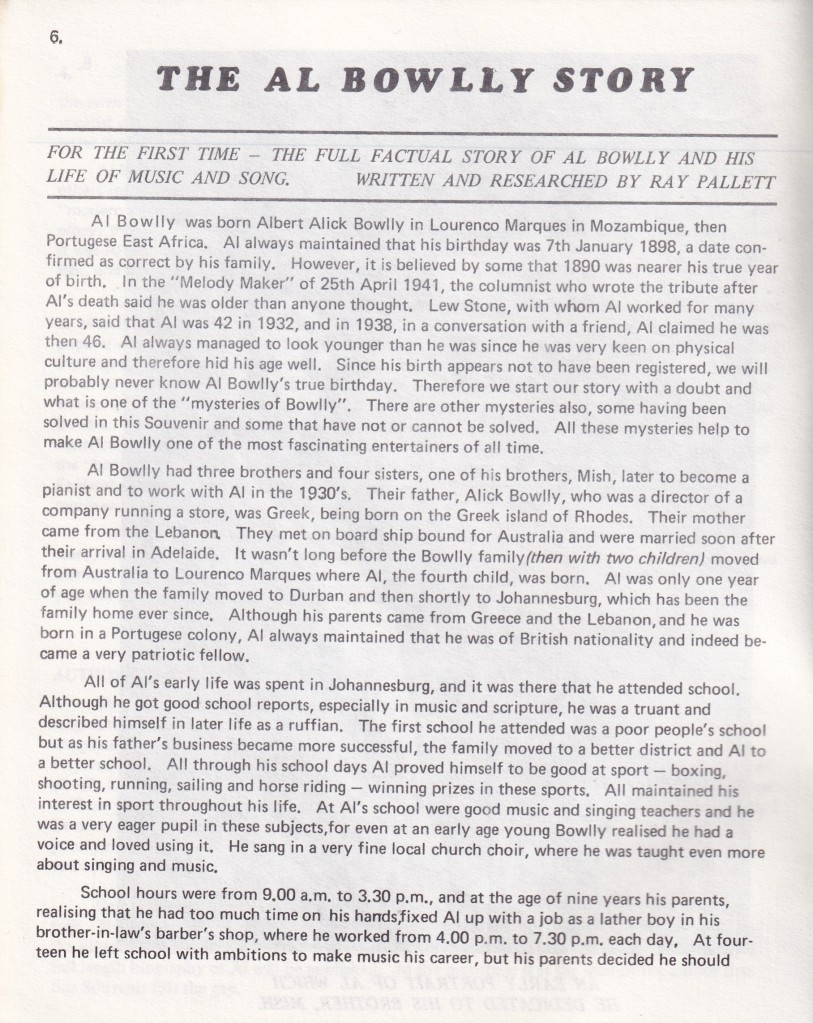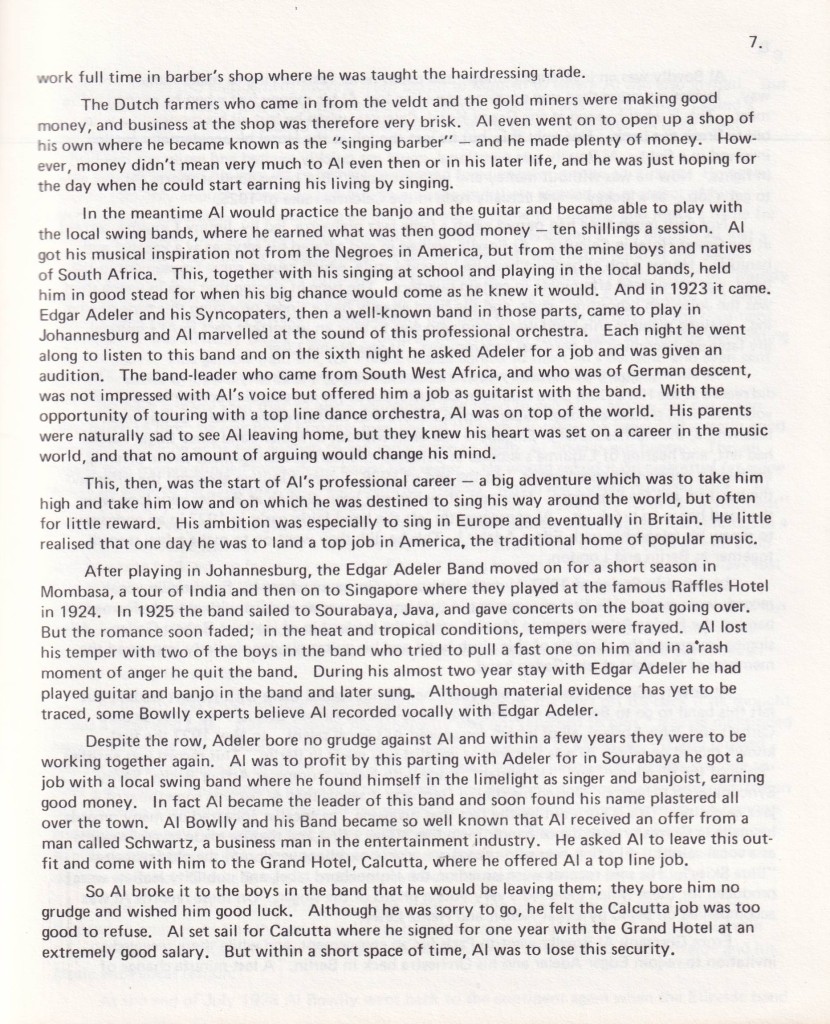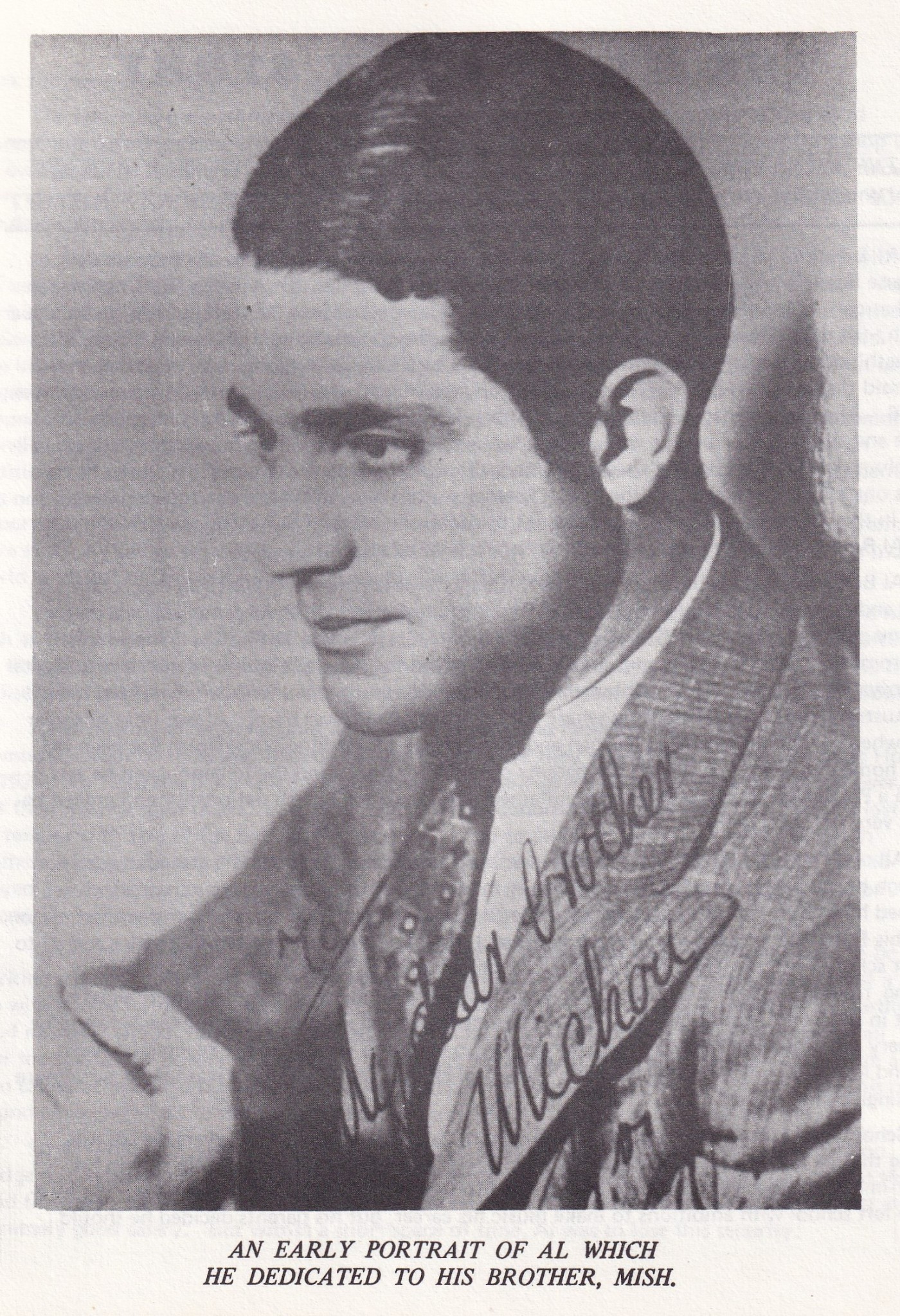FOR THE FIRST TIME – THE FULL FACTUAL STORY OF AL BOWLLY AND HIS LIFE OF MUSIC AND SONG.
WRITTEN AND RESEARCHED BY RAY PALLETT (1975)
Al Bowlly was born Albert Alick Bowlly in Lourenco Marques in Mozambique, then Portuguese East Africa. Al always maintained that his birthday was 7th January 1898, a date confirmed as correct by his family. However, it is believed by some that 1890 was nearer his true year of birth, ln the “Melody Maker” of 25th April 1941, the columnist who wrote the tribute after Al’s death said he was older than anyone thought. Lew Stone, with whom Al worked for many years, said that Al was 42 in 1932, and in 1938, in a conversation with a friend, Al claimed he was then 46. Al always managed to look younger than he was since he was very keen on physical culture and therefore hid his age well. Since his birth appears not to have been registered, we will probably never know Al Bowlly’s true birthday. Therefore we start our story with a doubt and what is one of the “mysteries of Bowlly”. There are other mysteries also, some having been solved in this Souvenir and some that have not or cannot be solved. All these mysteries help to make Al Bowlly one of the most fascinating entertainers of all time.
Al Bowlly had three brothers and four sisters, one of his brothers, Mish, later to become a pianist and to work with Al in the 1930’s. Their father, Alick Bowlly, who was a director of a company running a store, was Greek, being born on the Greek island of Rhodes. Their mother came from the Lebanon . They met on board ship bound for Australia and were married soon after their arrival in Adelaide. lt wasn’t long before the Bowlly family (then with two children) moved from Australia to Lourenco Marques where Al, the fourth child, was born. Al was only one year of age when the family moved to Durban and then shortly to Johannesburg, which has been the family home ever since. Although his parents came from Greece and the Lebanon, and he was born in a Portuguese colony, Al always maintained that he was of British nationality and indeed became a very patriotic fellow.
All of Al’s early life was spent in Johannesburg, and it was there that he attended school. Although he got good school reports, especially in music and scripture, he was a truant and described himself in later life as a ruffian. The first school he attended was a poor people’s school but as his father’s business became more successful, the family moved to a better district and Al to a better school . All through his school days Al proved himself to be good at sport – boxing, shooting, running, sailing and horse riding – winning prizes in these sports.- Al maintained his interest in sport throughout his life. At Al’s school were good music and singing teachers and he was a very eager pupil in these subjects, for even at an early age young Bowlly realised he had a voice and loved using it. He sang in a very fine local church choir, where he was taught even more about singing and music. School hours were from 9.00 a.m. to 3.30 p.m., and at the age of nine years his parents, realising that he had too much time on’ his hands, fixed Al up with a job as a lather boy in his brother-in-law’s barber’s shop, where he worked from 4.00 p.m. to 7.00 p.m. each day, At fourteen he left school with ambitions to make music his career, but his parents decided he should work full time in barber’s shop where he was taught the hairdressing trade.
The Dutch farmers who came in from the veldt and the gold miners were making good money, and business at the shop was therefore very brisk. Al even went on to open up a shop of his own where he became known as the “singing barber” – and he made plenty of money. However, money didn’t mean very much to Al even then or in his later life, and he was just hoping for the day when he could start earning his living by singing. ln the meantime Al would practice the banjo and the guitar and became able to play with the local swing bands, where he earned what was then good money – ten shillings a session. Al got his musical inspiration not from the Negroes in America, but from the mine boys and natives of South Africa. This, together with his singing at school and playing in the local bands, held him in good stead for when his big chance would come as he knew it would. And in 1923 it came Edgar Adeler and his Syncopaters, then a well-known band in those parts, came to play in Johannesburg and Al marvelled at the sound of this professional orchestra. Each night he went along to listen to this band and on the sixth night he asked Adeler for a job and was given an audition. The band-leader who came from South West Africa, and who was of German descent, was not impressed with Al’s voice but offered him a job as guitarist with the band. With the opportunity of touring with a top line dance orchestra, Al was on top of the world. His parents were naturally sad to see Al leaving home, but they knew his heart was set on a career in the music world. and that no amount of arguing would change his mind.
This, then, was the start of Al’s professional career – a big adventure which was to take him high and take him low and on which he was destined to sing his way around the world, but often for little reward. His ambition was especially to sing in Europe and eventually in Britain. He little realised that one day he was to land a top job in America, the traditional home of popular music.
After playing in Johannesburg, the Edgar Adeler Band moved on for a short season in Mombasa, a tour of lndia and then on to Singapore where they played at the famous Raffles Hotel in’1924. ln 1925 the band sailed to Sourabaya, Java, and gave concerts on the boat going over. But the romance soon faded; in the heat and tropical conditions, tempers were frayed. Al lost his temper with two of the boys in the band who tried to pull a fast one on him and in a rash moment of anger he quit the band. During his almost two year stay with Edgar Adeler he had played guitar and banjo in the band and later sung although material evidence has yet to be traced, some Bowlly experts believe Al recorded vocally with Edgar Adeler.
Despite the row, Adeler bore no grudge against Al and within a few years they were to be working together again’ Al was to profit by this parting with Adeler for in Sourabaya he got a job with a local swing band where he found himself in the limelight as singer and banjoist, earning good money. ln fact Al became the leader of this band and soon found his name plastered all over the town. Al Bowlly and his Band became so well known that Al received an offer from a man called Schwartz, a business man in the entertainment industry. He asked Al to leave this outfit and come with him to the Grand Hotel, Calcutta, where he offered Al a top line job. So Al broke it to the boys in the band that he would be leaving them; they bore him no grudge and wished him good luck. Although he was sorry to go, he felt the Calcutta job was too good to refuse. Al set sail for Calcutta where he signed for one year with the Grand Hotel at an extremely good salary. But within a short space of time, Al was to lose this security …….


